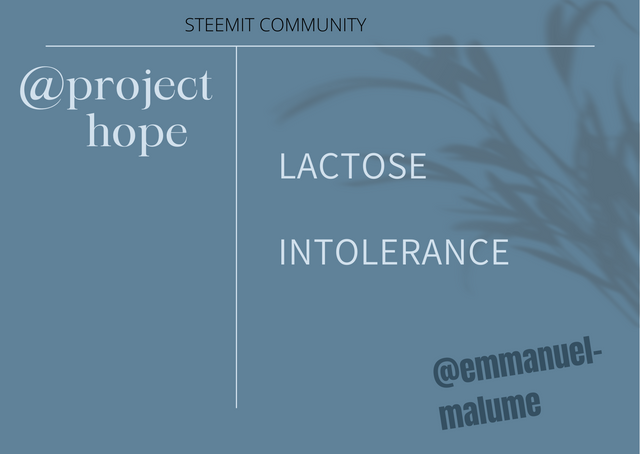
Lactose Intolerance. You might have come across this term in a book or on television. I know I did, and from what I could generally make out of the conversation in that show, the character refrained from consuming dairy products. That was a basic explanation I was content with, but it leaves a lot of grey area, doesn't it?
So what then is Lactose Intolerance - without all that medical vocabulary that tends to confuse people?
Simply put, it is the inability of the body to completely digest the sugar lactose which is found in milk and dairy products simply because your small intestine produces substantially low amounts of lactase, the enzyme responsible for the breakdown of lactose.
This condition is usually harmless, but it does cause the patient some discomfort. It is important to know that the condition can be managed without resorting to complete abstinence from dairy products.
Symptoms
Speaking from a symptomatic point of view, a lactose intolerant patient exhibits the following symptoms on ingestion of milk or dairy products:
- Diarrhoea.
- Gas.
- Bloating.
- Stomach Cramps.
- Nausea - can result in vomiting.
What Causes Lactose Intolerance?
Normally, lactase breaks lactose - be careful with that tongue twister - into glucose and galactose, which are absorbed through the lining of the intestine into the bloodstream.
A deficiency in lactase means that this absorption does not take place, and the food moves into the colon untouched, where bacteria present in the gut react with the undigested food to [produce the aforementioned symptoms.
Types of Lactose Intolerance
Primary Lactose Intolerance
Naturally, infants produce a large amount of lactase primarily because their diet is exclusively milk, and as time goes by, the amount of lactase produced decreases because the diet is no longer exclusively milk.
But here lies the problem: in the case of Primary Lactose Intolerance, instead of lactase production decreasing to a level that is still sufficient to support lactose digestion, production reduces drastically by adulthood, leading to intolerance.
Secondary Lactose Intolerance
This is caused by illness, injury, or surgical operations on the small intestine that affects lactose production. In case of illness, treatment of the disorder could increase lactase levels and alleviate the symptoms with time.
Congenital Lactose Intolerance
In rare cases, Lactose intolerance is developed even before childbirth. Genetics come into play here, as both parents have to possess the variant gene which expresses this disorder.
Treatment
Of course, the first thing that would come to one's mind is to not drink - say, a liter of milk every four hours? It's that simple -limit the amount of lactose-containing products you consume would go a long way in preventing those uncomfortable symptoms.
But if you still want to enjoy dairy products, then you can use a liquid or powdered lactase supplement.
Adding it to your milk helps to break down the lactose/
You can also purchase and consume ice cream, milk, and other dairy products that have had their lactose content reduced, of course with lactose intolerant patients in mind.
I hope this article was informative. Thanks for Reading!

For my part without touching the middle part I can say that I have two relatives who suffer from it, and I have asked them their response has been that it is terrible to suffer from this, because of the complications that can present in many aspects of your body and even life as such.
They do not give me details, but sincerely from what they tell me is that if they could make a wish is that this lactose intolerance disappears.
Downvoting a post can decrease pending rewards and make it less visible. Common reasons:
Submit
A wish is not enough
Proper treatment is
Downvoting a post can decrease pending rewards and make it less visible. Common reasons:
Submit
Excellent informative work, if we have always heard this term and people are often confused, we have tried within the diets for children with autism not consuming casein which has given a breakthrough to desiflamar the abdomen and digestive tract, thank you very much for such interesting contribution.
Downvoting a post can decrease pending rewards and make it less visible. Common reasons:
Submit
Thank you for listening
Downvoting a post can decrease pending rewards and make it less visible. Common reasons:
Submit
Wow, your article is really wonderful I have actually heard the term "lactose intolerance" but didn't understand what it means but now I have known the meaning, symptoms, causes and treatment thanks alot I have gained alot
Downvoting a post can decrease pending rewards and make it less visible. Common reasons:
Submit
Thank you
Downvoting a post can decrease pending rewards and make it less visible. Common reasons:
Submit
Hello @emmanuel-malume
Thank you for choosing project.hope HIVE, however I would need to ask you not to post within project.hope community if your publication is not related to topics such as (listed in our community description):
technology,
blockchain,
artificial intelligence
machine learning
economy,
business,
marketing, psychology, etc.
Posts in ENGLISH ONLY.
Otherwise you may unfortunatelly end up making our little community looking little messy. Hope I'm making sense?
ps.
Consider joining our PH community discord server:
https://discord.gg/uWMJTaW
Cheers, Piotr
Downvoting a post can decrease pending rewards and make it less visible. Common reasons:
Submit
Noted
Downvoting a post can decrease pending rewards and make it less visible. Common reasons:
Submit